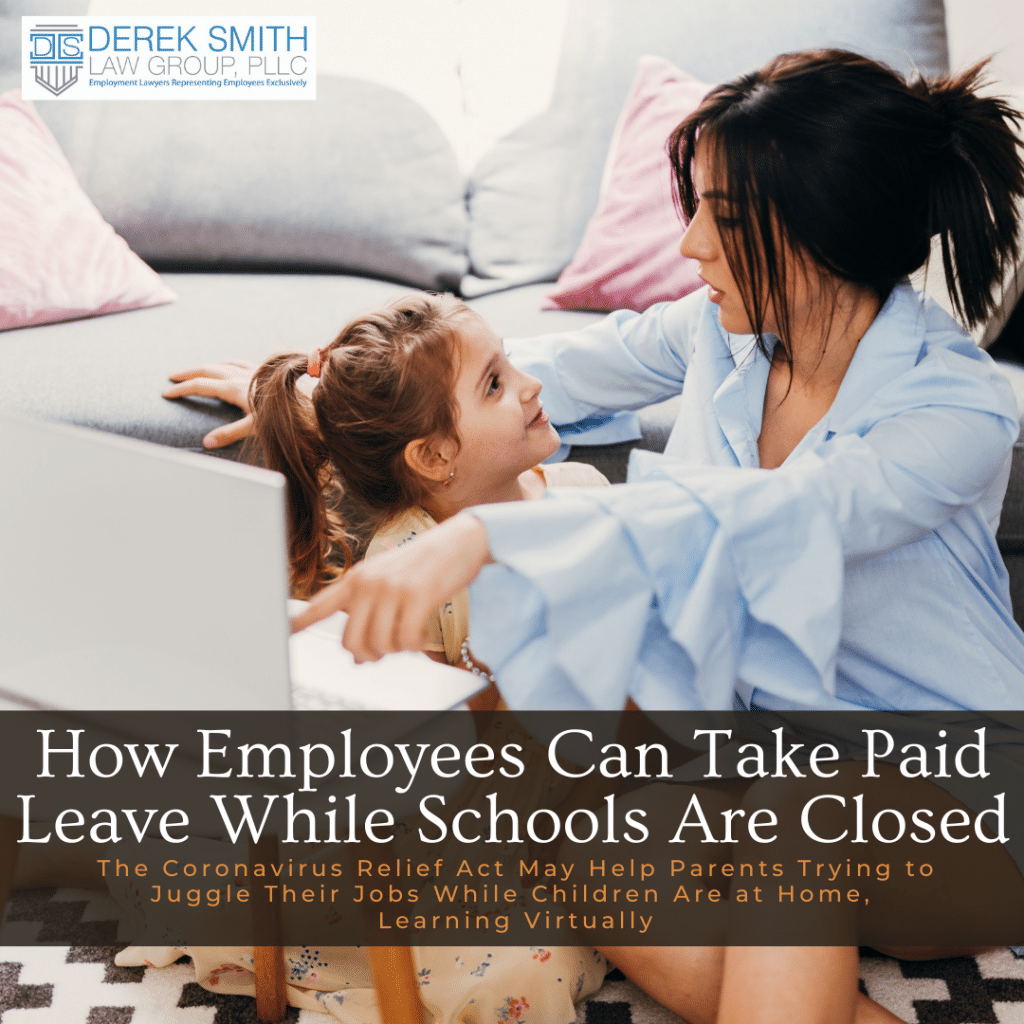The Families First Coronavirus Relief Act (FFCRA) May Help Parents Trying to Juggle Their Jobs While Children Are at Home, Learning Virtually.

The start of the 2020-2021 school year brings a new set of challenges to working parents. Working parents are forced to stay home and skip work because schools are closed. The silver lining for this problem exists in the Family First Coronavirus Response Act (FFCRA). The FFRCA provides parents paid time off to care for children when their schools are closed due to Coronavirus.
Many areas are experiencing the beginning of the school year like never before. Children are either learning completely online or through a hybrid learning model. Therefore, children of all ages will begin the school year with some form of remote learning.
Parents will need to step into the role of a teacher’s assistant for children with special needs and young children. They will need to help their children complete school activities, focus on the teacher and schoolwork at hand, and stay home to provide childcare and support.
What Is the FFCRA?
The FFCRA is the federal law developed to help individuals get paid while either dealing with a direct impact of Coronavirus or school closures relating to Coronavirus. In March 2020, the entire country was forced into quarantine.
During this time, daycare centers, schools, and many businesses closed. Those who could work from home did. Others worried about receiving pay if they had to stay home to care for their children and other family members.
Congress enacted the FFCRA. The FFCRA offered two options for people who needed to take time off for COVID issues.
The first piece is the Emergency Paid Sick Leave Act (EPSLA). Under the EPSLA, you are entitled to 2 weeks of paid time off to care for yourself or a family member or associate that either has COVID, is awaiting results of a COVID test, or is advised to quarantine due to potential COVID exposure. Parents can also use this leave to care for a child whose school or daycare is closed due to COVID. The Act helps employees who have worked for at least 1 day for a company.
The second piece is the Emergency Family and Medical Leave Expansion Act (EFMLEA). Any employee working for a company for at least 30 days can take up to 10 weeks of paid leave to care for a child whose school or daycare facility is closed due to COVID19.
Can Employees Use These Benefits If a Child’s School Is Closed Due to COVID-19?
The purpose of the FFCRA is to help families needing to take time off from work for COVID related reasons. Therefore, parents may need to stay home with their children if a school is closed due to COVID-19 rules, regulations, or illness.
They may first use the EPSLA for two weeks of paid leave during this time. Then, they can take the EFMLEA for an additional 10 weeks. The leave is available through December 31, 2020.
School is considered closed even if offering remote learning only or on specific days combined with hybrid learning.

Can Employees Use These Benefits Intermittently If a School Is Opened on a Hybrid Schedule?
The Family and Medical Leave Act (FMLA) allows employees to take unpaid leave for up to 12 weeks due to a medical issue. The FMLA can be used intermittently to address certain issues, such as regular doctor’s appointments or cancer treatments. It can also be used intermittently if you need to be a caretaker one or two days a week.
Therefore, many employees wonder if the EFMLEA can be used in the same manner. The law does not specifically state it can be used intermittently. However, states advise employers to be flexible whenever possible. The New York Federal Court stated that intermittent leave to care for a child while schools are closed doesn’t put an employee at risk of spreading COVID and should be allowed.
Can Employees Use These Benefits If They Choose to Keep a Child Home Even If the School Is Open?
The Department of Labor and the FFCRA is clear. Leave is available if facilities are closed due to Coronavirus. However, if you choose not to send your child to school, leave is not available. Some employers may choose to allow you to take the leave, however, it does not need to be paid.
Therefore, if you choose to keep your child home, but your school or daycare facility remains open, you are not entitled to EFMLEA or EPSLA pay.
Does FFCRA Coverage Continue If the School Reopens During the Requested Time Off?
Maybe your school intends to remain closed or on a hybrid schedule for 12 weeks. So, you apply for 12 weeks of FFCRA benefits. If your school reopens after 6 weeks, you cannot continue to stay home and receive FFCRA benefits. Once the school or daycare facility reopens, you must return to work or cease receiving benefits.
What Information Can an Employer Require for Benefit Approval?
The Department of Labor provided employers with extensive information relating to FFCRA leave and benefits. Employers must request the following information for their own records and proof that your leave qualifies for the payroll tax credits. The required information includes:
- Employee Name
- Dates of Leave
- Reason for Leave
- A Statement the Employee Cannot Work Due to Leave Reason.

Can an Employer Deny the Right to Leave to a Qualified Employee?
Typically, an employer cannot deny the right to leave for qualified employees. However, the law understands some employers cannot function if forced to give every qualified employee leave. Therefore, any employer that would suffer financial hardship and be unable to operate by providing leave to employees can deny FFCRA benefits.
Employers must show the hardship provided by allowing FFCRA leave to demonstrate the denial is legal, as opposed to discriminatory or illegal in any way.
Can an Employer Take Action Against Any Employee Using FFCRA Leave During School Closings?
You have the right to receive FFCRA leave if your child’s school is closed. Your employer also has an obligation to post information in the office for all to see. If your employer violates these obligations, you have a right to compensation.
Denial of FFCRA benefits would fall under the guidelines of the Department of Labor (DOL). Therefore, any lawsuit would follow the rules of the DOL. You may file a claim directly in federal court.
If you find denial is related more to gender or other discriminatory reasons, such as national origin or race, you may have a claim under Title VII of the Civil Rights Act or other employment discrimination laws. Therefore, you may also file a claim with the EEOC for employment discrimination.
Finally, if your employer fires you because you took FFCRA pay, it is wrongful termination. This wrongful termination is a form of retaliation. Retaliation will also occur if your employer demotes you or reduces your hours or pay because you took leave. If these issues occur, you can file a lawsuit for retaliation under the rule of the DOL.

What Should Employees Do If an Employer Denies Leave?
Unless your employer falls under the law’s exceptions, you have a right to paid leave to care for your child during school closings with hybrid learning or remote and virtual learning availability. If your employer denies your leave, you have a right to justice.
Keep notes of everything as it occurs. Save emails and text messages relating to this issue. To learn more about your rights under the law, and how to receive the compensation you deserve, contact the experts at the Derek Smith Law Group at 800-807-2209 for a free consultation. Our best employment and discrimination attorneys can help you fight for your rights.

 Derek Smith
Derek Smith